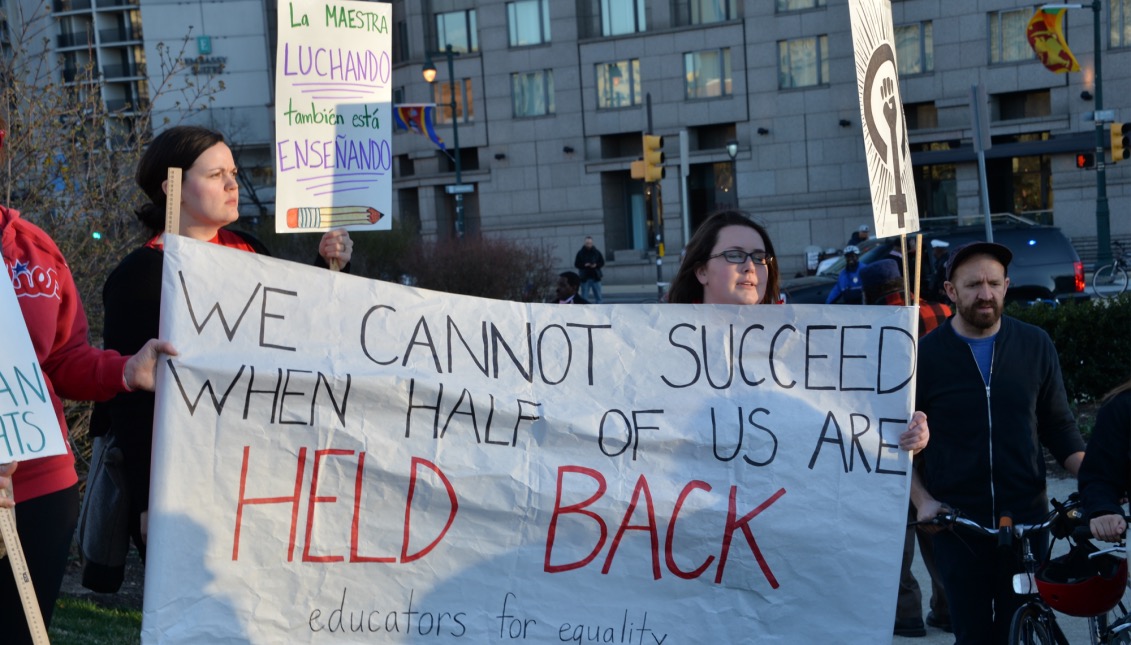
This is not a celebration, this is a claim for our rights!
Even before five o'clock in the afternoon, dozens of women with posters, megaphones, and pink caps were being seen walking downtown. The meeting was in Logan…
Even before five o'clock in the afternoon, dozens of women with posters, megaphones, and pink caps were being seen walking downtown. The meeting was in Logan Square, in the heart of Philadelphia. The occasion? Well, that depends on the perspective: for an unaware bystander (who generally has no perspective), it was one more celebration of International Women's Day. On the other hand, for those with a gender perspective, "celebration" is not a word that does justice to March 8th.
So, since it is not a celebration then it is a commemoration, or -in other words- a remembrance and a claim. And that was precisely what hundreds of women (and some men, and children) did on Wednesday in the "Cradle of the Nation": they remembered why there is still much left to do in order to celebrate a life plenty of rights.
For Global Women's Strike member in Philadelphia Phoebe Jones, taking the city streets in protest is as prevalent as poverty in the world's leading power: "The current situation of working women (from professionals to housewives) is precarious. Philadelphia has the highest rates of poverty and extreme poverty in the country, and women (with their children) are the most affected. Not only because of the wage gap, but also because of the lack of equal opportunities."
RELATED CONTENT
Mara Henao, a Colombian woman raised in the United States, a teacher, mother of two and activist of Philly Socialists, moves along the same line. "If someone is a woman, mother, single and poor, she will hardly get a job that allows her to take care of her children, rent a house or pay for childcare. I’m a teacher and if I want to take care of my children I have to get part-time jobs where I make $20.00 an hour or where I can work off-hours."
And that's why Mara was there too. That's why she shared the Spanish version of the International Women's Strike manifesto because she is supportive. She ran - leaving the journalist behind- when the march began moving slowly at 5:30 p.m., all the way down the Benjamin Franklin Parkway, heading east.
The mobilization was almost three blocks long and lasted two and a half hours. Phoebe later said that she was satisfied with the rally "because it engaged about a thousand women to take action in the streets." To establish the veracity of this figure is a useless effort, what's certain is that the march never stopped chanting, never stopped moving and never hesitated to go ahead; not even when it turned west on Locust and 12th street in the wrong direction and gulping down dozens of cars.
Christine, a 50-year-old woman, arrived to the event with her seven-and-a-half-year-old daughter Isabelle, who did not miss her step and said she had a great time surrounded by so many people. It was a moral duty for Christine to demonstrate her solidarity and commitment to women, to Philadelphia and to the democracy of her country: "I could not stay home and miss this," she shouted before vanishing into the crowd.
She and her daughter Isabelle, Mara, Phoebe, Nazia, Olivia, Stephanie, the old woman who didn't want to say her name (and the rest of the women, men, and children who gathered) put Philadelphia on the map of the International Women's Strike, an initiative that was born in October 2016 in Poland, Argentina and South Korea in response to gender violence and the social, political and economic inequality faced by millions of women every day. In less than six months, this initiative managed to articulate social and feminist organizations from over 50 countries and in the United States, bringing out to the streets millions of women to carry out the first Day Without Women.











LEAVE A COMMENT: